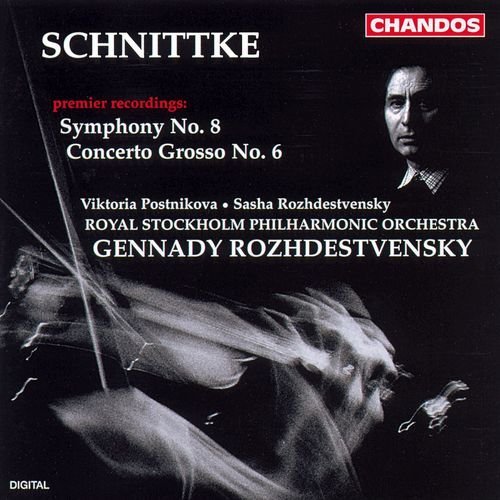
Royal Stockholm Philharmonic Orchestra, Gennady Rozhdestvensky - Schnittke - Symphony No.8 / Concerto grosso No.6 (1995)
BAND/ARTIST: Royal Stockholm Philharmonic Orchestra, Gennady Rozhdestvensky
- Title: Schnittke - Symphony No.8 / Concerto grosso No.6
- Year Of Release: 1995
- Label: Chandos
- Genre: Classical
- Quality: FLAC (image+.cue,log,scans)
- Total Time: 53:24
- Total Size: 185 Mb
- WebSite: Album Preview
Tracklist:
Concerto grosso No.6:
[01] I. Andante-Allegro
[02] II. Adagio
[03] III. Allegro vivace
Symphony No.8:
[04]I. Moderato
[05] II. Allegro Moderato
[06] III. Lento
[07] IV. Allegro moderato - Allegro vivace -
[08] V. Lento
Performers:
Viktoria Postnikova, piano
Sasha Rozhdestvensky, violin
Royal Stockholm Philharmonic Orchestra
Gennady Rozhdestvensky, conductor
Concerto grosso No.6:
[01] I. Andante-Allegro
[02] II. Adagio
[03] III. Allegro vivace
Symphony No.8:
[04]I. Moderato
[05] II. Allegro Moderato
[06] III. Lento
[07] IV. Allegro moderato - Allegro vivace -
[08] V. Lento
Performers:
Viktoria Postnikova, piano
Sasha Rozhdestvensky, violin
Royal Stockholm Philharmonic Orchestra
Gennady Rozhdestvensky, conductor
The late Alfred Schnittke has, after his death, been accused of writing too much music of variable quality. This debate is still raging although suffice to say that the Eighth Symphony truly is one of his greatest works and indeed, one of the great symphonic works of the latter twentieth century. The charge of oppressive asceticism laid against the Sixth and Seventh symphonies can hardly be held up to this expansive and frankly emotional work. It is as if Schnittke relaxed the skeletal sounds of his previous essays in the genre and, while not quite returning to the dazzling orchestral pyrotechnics of the Fifth Symphony (Concerto Grosso no. 4), creating a work of great sincerity and beauty. The first movement is an obsessive repetition of a wide-ranging (in pitch, not rhythm) melody, seemingly effortlessly varied to touch on all sections of the orchestra. The climax is reached early in the movement and the remainder is a chilling decrescendo, the harmonies becoming more static and dissonant. The second and fourth movements are bitter, angry and Shostakovichian in their use of dissonant intervals to create a long line. They share thematic material, yet shards of the first and third movements invade to further complicate the texture. The eighteen minute third movement is a remarkable achievement. It seems to pick up the wisps of tonality discernable at the end of Mahler's Ninth and convert them into a long elegy for a lost romanticism. The sparsity of texture (often long stretches of monophonic strings) throws the emotive weight totally on the long, twisting and often stunningly beautiful melodies that emerge. The entrance of the low brass towards the end is just one of the profound moments in this stunning meditation on life, and the afterlife. After the rage of the fourth movement, the fifth movement provides a truly wonderful solution to the problems of the previous ones- a slowly ascending c major scale is caught by various instruments, always ppp and the work ends with this visionary cluster. This performance is greatly superior to the one by Polyansky. Polyansky's recordings of the earlier Schnittke symphonies have been wonderful, although I feel that Rozhdestvensky emphasises the deeper emotions in this one, while Polyansky barely scratches the surface. Also, the orchestra's playing is much better. Polyansky's orchestra rushes painfully through the first movement and is not in tune in the last!
The Sixth Concerto Grosso is a rather pithy work, containing Bachian string figurations yet its rather limited material does not outstay its welcome in its 15 minute duration. It is however, a better coupling than on Polyansky's- the 'Census List' suite really is second-rate Schnittke.
The Sixth Concerto Grosso is a rather pithy work, containing Bachian string figurations yet its rather limited material does not outstay its welcome in its 15 minute duration. It is however, a better coupling than on Polyansky's- the 'Census List' suite really is second-rate Schnittke.
Classical | FLAC / APE | CD-Rip
As a ISRA.CLOUD's PREMIUM member you will have the following benefits:
- Unlimited high speed downloads
- Download directly without waiting time
- Unlimited parallel downloads
- Support for download accelerators
- No advertising
- Resume broken downloads


